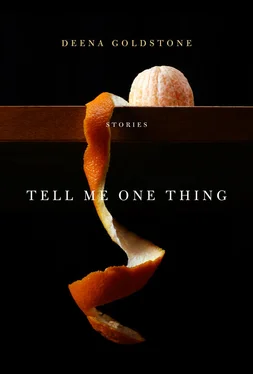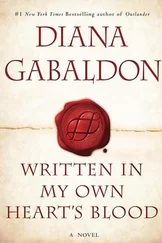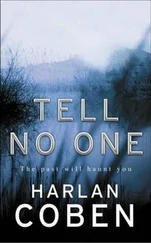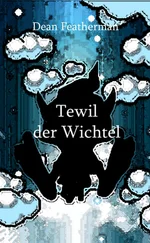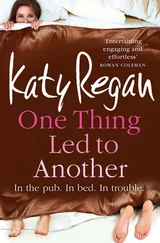He shakes his head no.
“That was my task, and yours is to open up the lockbox where you’ve stuffed everything since you were a teenager. The beatings. The night Dad almost killed you …”
“Stop it, Ellen!”
“I won’t stop it! I won’t give up on you!”
She makes a right on India Street, too fast. Jamie can feel the car tremble. She doesn’t realize. She’s focused on Jamie, on having him understand, on saving his life. The ArtWalk is right in front of them, down about a block. The street and sidewalk are packed with people, walking toward it. Families with children in strollers. People who’ve come with their dogs. There’s a live band at the corner of Fir and India, and their amplified sound blasts out into the twilight air.
“Ellen!” he yells above the music. He wants her to slow down, but he’s not sure she can hear him.
“You have to listen to me, Jamie!” Her voice is urgent. She’s searching his face to see how far she can push.
“Look!” He’s pointing at the people in front of them clogging the street, but she’s too intent upon her mission. She will save her brother. She won’t be derailed.
“Your life is at stake!” She’s screaming now over the music, her body taut, rising up from the seat, her foot pressing down on the accelerator, but she doesn’t realize. The car is speeding. The streets are clogged with pedestrians.
“Stop!” he screams at her. “Stop, Ellen, stop!”
He grabs the wheel, but it’s too late. The first body hits the car with a sickening thud. The next with a scream that pierces his heart and shatters it.
Ellen slams on the brakes and the car comes to a shuddering stop. She stares with horror at the carnage in front of her, unable to move. Jamie pushes open the passenger door and gets out. To see what happened, to help if he can. But it’s too late, he sees. Oh God, it’s too late . The damage has already been done.
HAVING SPENT MOST OF HIS FORTY-THREE years intimately acquainted with the notion that the sins of the father are visited upon the son, Jamie O’Connor now contemplates the sins of the sister. Deep in the middle of the night, as he drives from his home to University Hospital, he tries to determine what his responsibility is to carry those.
Twenty-four days ago his sister Ellen plowed into a crowd of people walking to a street fair. She was driving his car. He was there, sitting in the passenger’s seat. Should he hold himself culpable for her act? For not insisting when she picked him up from school that Friday afternoon that she slide over and let him drive? Should he have seen she was in no shape to be behind the wheel?
But she seemed fine , Jamie argues with himself. By now, he’s had this internal debate too many times to count. It’s boring and compelling and urgent all at the same time. She drove with confidence. Like a pro. She could have given a master class on how to navigate the I-5 Freeway , he reminds himself yet again.
All right, then, maybe he can’t fault himself for not taking the wheel at the beginning of the ride, but what about once she became agitated? Once he saw her knuckles whiten, her hands clutch the steering wheel too tightly? What about when he saw her back press up against the driver’s seat as if she wanted nothing more than to burst through her skin?
But how do you do that? How do you force a person to stop a car safely? When I yelled at her to stop, did that just make things worse?
A groan escapes from deep within him and Jamie shakes his head slightly, alone in his car. What part of this disaster was his fault? What should he have seen that he missed? How much of the carnage could he have realistically prevented? There are no answers to his questions. He knows that now. It is the weight of this burden that propels him through the streets of San Diego.
It seemed to Jamie for weeks after the accident that there was nothing else on the local television news or in the papers—“Sister of San Diego Teacher Crashes Car into ArtWalk Crowd.” Several people had whipped out their cell phones at the first horrified scream, and their grainy videos were played on the networks obsessively. Various police officers were interviewed on camera. The accident-reconstruction people brought out their renderings of tire tracks and skid marks. And one channel ran animated drawings of the bodies’ trajectories as they flew, endlessly, through the air.
Jamie’s colleagues at Pacific Village Middle School turned up on news cameras regularly, all expressing shock. Jamie was so quiet, such a gifted teacher , they uniformly said. Some had met Ellen when she visited school to watch Jamie teach. She seemed so nice , they said. Everyone seemed genuinely puzzled how something so awful could happen to such decent people.
That question had led to the second round of media speculation. Mental health experts, from the safety of their armchairs, offered opinions about the driver’s possible mental state — repressed hostility, depressive disorder, a subconscious suicide wish. Then legal experts weighed in on probable trial strategies for both sides. None were shy to predict outcomes and sentences.
But no one had talked to Ellen. She was in jail. Her bail had been set at five hundred thousand dollars, and neither Jamie nor anyone he knew had the kind of money it would have taken to get her out.
Seven people had been injured, two seriously. A forty-seven-year-old manager at a Sears store in Chula Vista had suffered broken bones, a lacerated spleen, and internal bleeding. He was recovering. The other, a graduate student at the University of California, San Diego, was still in the intensive-care unit, where her survival chances had been broadcast almost hourly by every local news outlet.
It is Celeste that Jamie comes to see in the middle of the night. The first time, five days after the accident, he felt compelled to go. He knew it made no sense. What could he offer? Why would anyone want him there? Logical questions, but completely irrelevant to the imperative he felt. He needed to be there.
He waited until very late at night, after the news cameras were gone and the hospital staff was a skeleton crew. Then it was simple to slip through the emergency entrance. No one paid him much attention at two o’clock in the morning. He took the elevator up to the seventh floor. He knew where the intensive-care unit was from the time one of his students had swallowed too many of her mother’s pills. Jamie had kept the vigil with her family until the girl was out of danger and moved to the psychiatric floor.
When he walked into the waiting room of the ICU, he knew immediately that the man sitting alone in there was her father. The papers had said she was from Montana, doing graduate work in marine biodiversity and conservation. They all mentioned she had grown up on a horse farm not far from Helena, as if there was something faintly exotic about it all — life on a ranch, raised by a single father.
The man sitting there looked like everyone’s image of a cowboy — a body made lean from physical labor, a face weathered from being outside through all seasons, dark hair needing a cut and laced with gray, spilling over the collar of a blue work shirt. Late fifties, Jamie guessed. The man sat very still, the weight of his body on the balls of his feet, his back not touching the vinyl of a yellow molded chair. To Jamie he looked as if he was holding himself back from springing up and rushing out of this godforsaken place. Jamie’s eyes went to the man’s hands. They were open and splayed flat on his thighs, the only part of him that didn’t seem poised for flight.
Jamie sat down next to him, knowing he needed to say something but without a clue what that might be. “Mr. Jewell?”
Читать дальше
